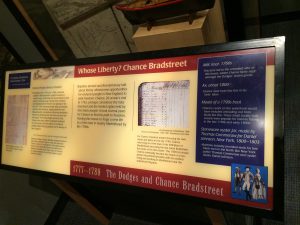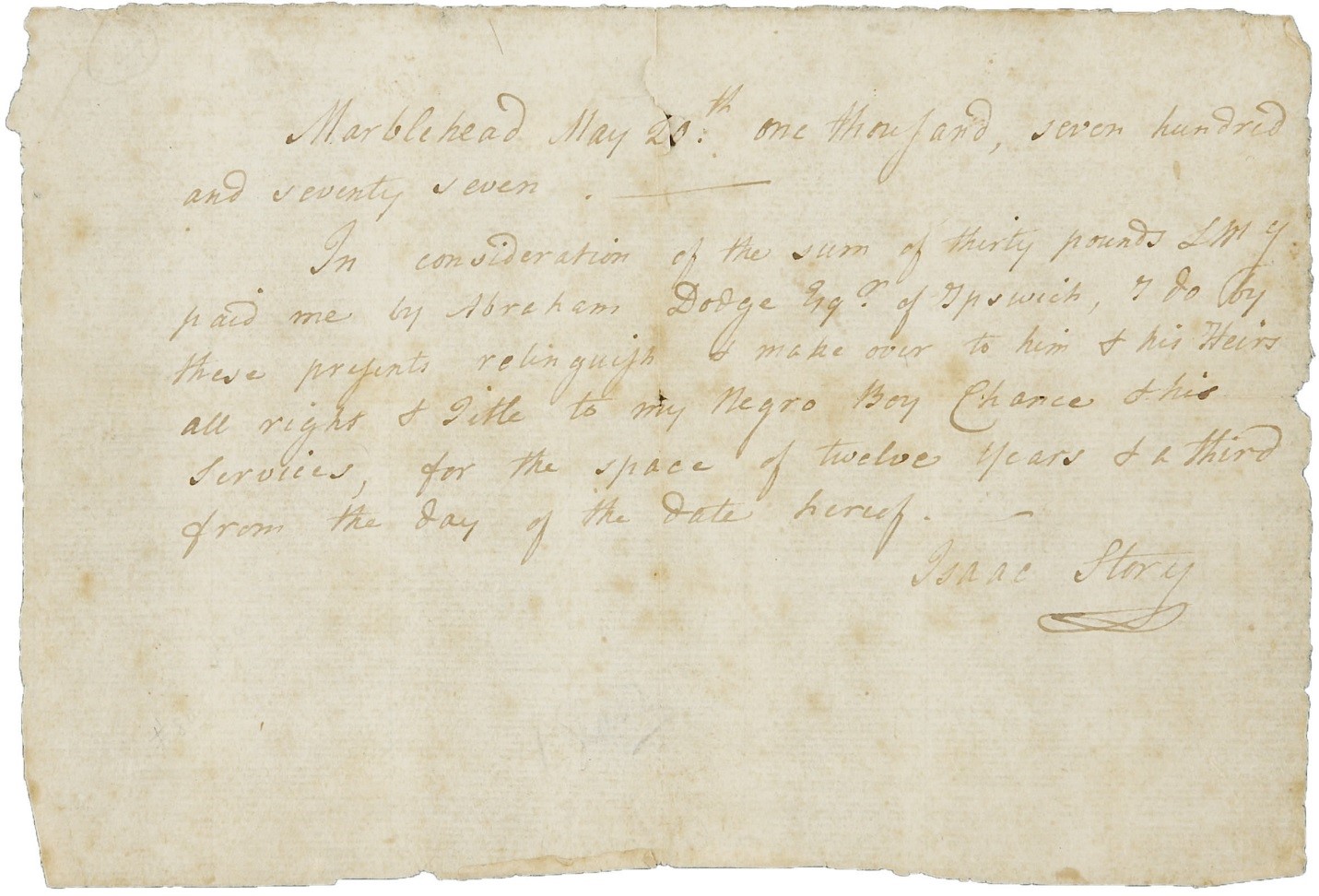
In 2010 I visited the Smithsonian National Museum of American History. An exhibit that caught my eye was called Within these Walls, which told the stories of five families who lived in a house in Ipswich, Massachusetts for more than two centuries. The period covered ranges from the Choate family as American colonists in the 1750s to the Scott family during the Home Front of the 1940s. The second family covered, under the period of “Revolutionaries – 1777–1789,” was the Dodge family, under the heading “the Dodges and Chance.” The Dodge household included an African-American man named Chance, as noted in Abraham Dodge’s 1786 will, where Abraham left his wife Bethiah “all my Right to the Service of my Negro Man Chance.” At the time I saw this exhibit, that reference was essentially all the show’s curators knew about Chance.
 I thought it would be an interesting challenge to see if I could find anything else out, in part thanks to searching tools that were not available when this exhibit first opened. By using various first name only searches, I identified an African-American slave named Chance Bradstreet, born in nearby Marblehead, Massachusetts in 1762. He was first owned by the Rev. Simon Bradstreet (1709–1771), and I found Chance, and his likely mother Phillis, identified as human property in the minister’s lengthy 1771 inventory.
I thought it would be an interesting challenge to see if I could find anything else out, in part thanks to searching tools that were not available when this exhibit first opened. By using various first name only searches, I identified an African-American slave named Chance Bradstreet, born in nearby Marblehead, Massachusetts in 1762. He was first owned by the Rev. Simon Bradstreet (1709–1771), and I found Chance, and his likely mother Phillis, identified as human property in the minister’s lengthy 1771 inventory.
 From there I surmised Chance became the slave of Bradstreet’s son-in-law, Rev. Isaac Story (1749–1816), who succeeded his father-in-law as minister of the Second Marblehead Church. A newspaper announcement in 1773 alluded to a wedding that Bradstreet had performed nine or ten years before between his slave Philllis and an African-American man of Marblehead. The service was somehow deficient, since Story, as Phillis’s new owner, had to perform the marriage again: this scenario is reflected in the Marblehead records, which show a 1773 marriage between Fillis Story and Francis Glover.
From there I surmised Chance became the slave of Bradstreet’s son-in-law, Rev. Isaac Story (1749–1816), who succeeded his father-in-law as minister of the Second Marblehead Church. A newspaper announcement in 1773 alluded to a wedding that Bradstreet had performed nine or ten years before between his slave Philllis and an African-American man of Marblehead. The service was somehow deficient, since Story, as Phillis’s new owner, had to perform the marriage again: this scenario is reflected in the Marblehead records, which show a 1773 marriage between Fillis Story and Francis Glover.
I thought I might have the right Chance in Essex County, and then theorized that by the early 1770s, Chance was a slave of Isaac Story; still, in 1786 he was a slave belonging to Abraham Dodge. Dodge’s brother Thomas was married to Isaac Story’s sister Eleanor/Ellen, so the two men shared a family connection. I did a series of Google searches with Chance, Story, Dodge, Ipswich, Marblehead, Negro, and other search terms in and out of quotation marks. Many of the terms above, even when applying to people – Chance, Story, and Dodge – are also words themselves, so I came up with many results that had no bearing on the subjects I was searching. Finally, though, I found the “clinching” document, a slave lease from 20 May 1777, where Chance, at fourteen years of age, was leased to Abraham Dodge of Ipswich!
 The above lease had been auctioned by Heritage Auctions, Inc., and had sold in 2009 for $597.50, just one year before I started this research.
The above lease had been auctioned by Heritage Auctions, Inc., and had sold in 2009 for $597.50, just one year before I started this research.
With the assistance of Bob Booth, a Marblehead historian, we uncovered further details about Chance Bradstreet back in Marblehead, to which he apparently returned at some point and where he died in 1810. This twelve-year lease may have kept Chance in servitude longer than other people of color in Massachusetts, as the 1783 Quock Walker case stated that slave owners had no recourse in court against their slaves; how quickly this ruling took effect is uncertain.
I had also hoped that I might be able to identify descendants of Chance, although since I began my research I have not found any evidence that Chance ever married or had children. Still, a difficulty in African-American research is sometimes earlier people of color may be only be identified for a “pocket of time,” for a few decades, and getting the necessary links for relatives down to the present day is not always possible. I was happy about the material I did find about Chance between his birth in 1762 and death in 1810, his series of owners, his likely mother, and other local data.
The entire story of my research was written up in American Ancestors magazine. The staff at the Smithsonian has revamped the exhibit with significant detail on Chance and the addition of enhanced visitor experiences to help tell this story over the coming year. The new facts uncovered help delineate the changing legal and social forms affecting a formerly enslaved person of color following the American Revolution. I encourage people to check out the updated exhibit, which is now part of a transformed thematic second floor west wing featuring exhibits highlighting The Nation We Build Together, which debuts today.
Well done!!
In regards to your earlier article on Vital Records for N.E. and what is available, I attempted to submit information to DAR regarding Silence Leonard Hathaway (24 Apr 1787 – 07 May 1870) using only the Holbrook (Gill, MA) as no other records seem to exist, but books universally show her birth as the same date as Holbrook. What is your opinion about using Holbrook exclusively for genealogical proof?
Sue – that birth from Holbrook is not from a contemporary vital record, rather a History of Gill genealogy that was compiled by Ralph M. Stoughton in 1960 that Holbrook chose to include. The date may very well be correct, but it’s not a vital record, it’s a published genealogy, you’d want to verify the material summarized in the genealogy based on what facts can be confirmed.
Bah humbug. Thank you for responding. Now I know. Stoughton is a family name of mine from Judith Stoughton Denman Smead, 9th gg.
What a fascinating story, and a wonderful job of research! And look at what a difference you have made in how Chance’s story will now be presented. Awesome work! Thanks for sharing.
Visiting the museum is an adventure, but seeing the Ipswich house made a personal connection for me. My great grandmother was born in Ipswich and it seems most of her ancestors were there since the beginning of the town. We even have Dodge family members who married into our family. While I don’t have a direct connection to this house, it certainly reflects life in Ipswich as my ancestors would have experienced it maybe just down the street. Thanks not only for doing the additional research, but for sharing here what you found.
You never cease to amaze me, Chris. What a great story!
Good job. We have left too many people out of history and now can remedy that with advanced search tools. While we may never know the full story of some, we certainly know more than we did. You did a good thing.
This was beyond awesome Chris – such good work!!!
Hidden history.